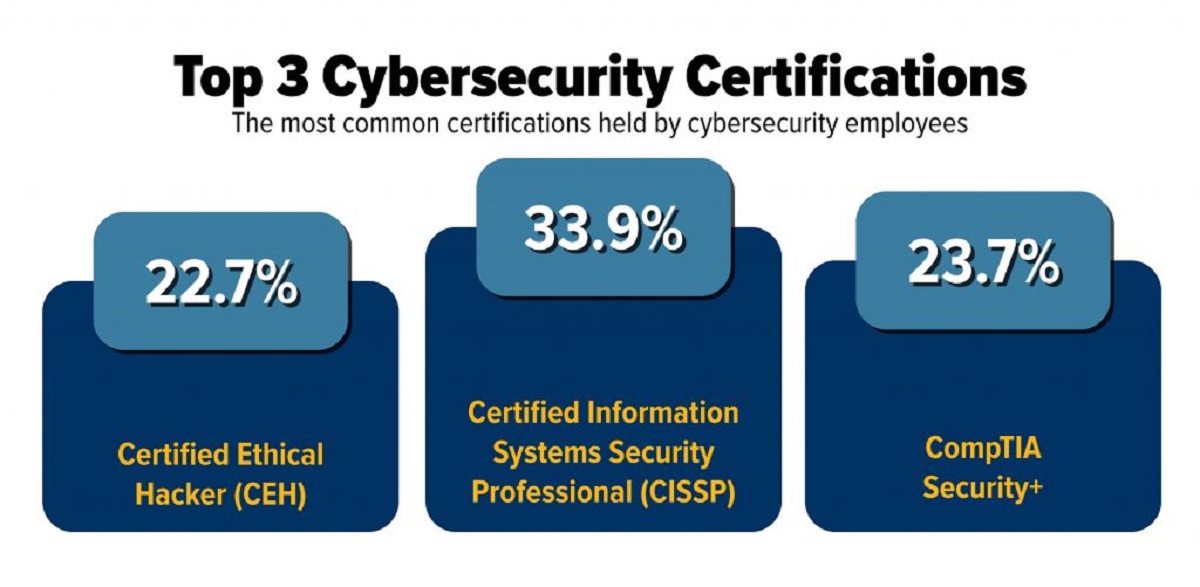Introduction
Welcome to the world of cybersecurity! With the increasing reliance on technology in all aspects of our lives, the need for skilled cybersecurity professionals has never been greater. Whether you’re a recent high school graduate, a career changer, or someone looking to enhance their skills, getting into cybersecurity without a degree is possible. This field offers numerous opportunities for growth and career advancement, with high demand for professionals who can protect information systems from cyber threats.
While a degree in cybersecurity or a related field can certainly provide a solid foundation, it is by no means the only path into this exciting and rewarding field. Many successful cybersecurity professionals have forged their own paths through a combination of self-learning, industry certifications, hands-on experience, and networking.
In this article, we will explore the steps you can take to get into cybersecurity without a degree. From understanding the basics of cybersecurity to building a strong skill set and obtaining industry certifications, we will guide you through the process of becoming a sought-after cybersecurity professional. So, let’s get started on your journey to an exciting career in cybersecurity!
Step 1: Understand the basics of cybersecurity
Before diving into the world of cybersecurity, it is crucial to have a solid understanding of the fundamental concepts and principles. Cybersecurity involves protecting computer systems, networks, and data from unauthorized access, damage, or theft. To begin your journey, consider the following steps:
- Educate yourself: Start by researching online resources, attending webinars, and reading books related to cybersecurity. This will help you grasp the fundamental concepts such as network security, encryption, malware, and access controls.
- Stay updated with industry news: Cybersecurity is a rapidly evolving field, with new threats and technologies emerging constantly. Subscribe to industry newsletters, follow cybersecurity blogs, and engage with the community to stay informed about the latest trends and developments.
- Join online communities: Participate in online forums and communities dedicated to cybersecurity. Engaging with professionals in the field can provide valuable insights, tips, and advice.
Understanding the basics of cybersecurity is essential as it lays the foundation for further learning and skill development. By gaining knowledge about common vulnerabilities and attack vectors, you will be better equipped to protect digital assets and identify potential threats.
Step 2: Build a strong foundation in IT skills
Having a solid foundation in IT skills is crucial for success in the field of cybersecurity. Here are some steps you can take to build your skills:
- Learn networking basics: Understanding how computer networks function is essential in cybersecurity. Familiarize yourself with concepts such as IP addressing, routing, protocols, and network security.
- Master operating systems: Gain proficiency in popular operating systems such as Windows, Linux, and macOS. Learn how to navigate through the command line, manage user accounts, and configure security settings.
- Learn programming: Coding skills are highly valuable in cybersecurity. Focus on languages such as Python, Java, or C++, as they are widely used in developing security tools and automating tasks.
- Understand databases: Get acquainted with the basics of database management systems and SQL. Understanding how databases store and retrieve information is crucial for assessing and securing data.
- Develop problem-solving skills: Cybersecurity involves constant problem-solving and critical thinking. Engage in activities that enhance your logical reasoning, analytical thinking, and troubleshooting abilities.
- Practice virtualization: Virtualization technologies like VMware or VirtualBox allow you to create virtual environments for learning and testing. Utilize them to simulate real-world scenarios and practice securing virtual networks.
Building a strong foundation in IT skills will provide you with the necessary knowledge to understand the inner workings of systems and networks, enabling you to identify vulnerabilities and implement effective security measures.
Step 3: Obtain industry certifications
Industry certifications play a crucial role in establishing your credibility and expertise in the field of cybersecurity. They demonstrate your knowledge and skills to potential employers and can greatly enhance your career prospects. Here are some popular cybersecurity certifications worth considering:
- CompTIA Security+: Widely recognized, this certification covers the foundational principles of cybersecurity and is a great starting point for beginners.
- Certified Ethical Hacker (CEH): This certification focuses on ethical hacking techniques, allowing you to assess systems for vulnerabilities and apply appropriate defenses.
- Certified Information Systems Security Professional (CISSP): Regarded as the gold standard in cybersecurity certifications, CISSP validates your knowledge across various security domains.
- GIAC Security Essentials (GSEC): This certification covers a wide range of topics, including network security, access controls, and incident response.
- Certified Information Security Manager (CISM): Geared towards management-level roles, CISM emphasizes governance, risk management, and compliance.
- Certified Information Privacy Professional (CIPP): This certification focuses on privacy laws and regulations, an important aspect of cybersecurity.
Research the certifications that align with your career goals and interests, and invest time in studying the required topics. Most certifications offer study materials, practice tests, and training programs that can help you prepare for the exams. Additionally, consider joining study groups or attending boot camps to enhance your learning experience and connect with other aspiring cybersecurity professionals.
Earning these certifications showcases your commitment to professional development and can give you a competitive edge when applying for cybersecurity positions.
Step 4: Gain practical experience through internships or volunteering
Gaining practical experience in cybersecurity is essential to solidify your skills and increase your employability. Internships and volunteering opportunities can provide valuable hands-on experience in real-world settings. Here’s how you can make the most of these opportunities:
- Internships: Look for cybersecurity internships offered by companies, government agencies, or non-profit organizations. These internships can provide exposure to different aspects of cybersecurity, such as incident response, vulnerability assessment, or security operations. Apply to internships that align with your interests and career goals.
- Volunteering: Seek out volunteer positions with organizations that focus on cybersecurity awareness and education. This could involve assisting with security conferences, workshops, or community outreach programs. Not only will this help you gain practical experience, but it also demonstrates your commitment to giving back to the cybersecurity community.
- Personal projects: If traditional internships or volunteering opportunities are not readily available, consider working on personal projects that allow you to apply your cybersecurity skills. This could involve setting up a home lab to practice penetration testing, developing a security tool or script, or contributing to open-source projects on platforms like GitHub.
- Networking: While gaining practical experience, take the opportunity to expand your professional network. Connect with professionals in the field, attend industry events, and engage in cybersecurity communities. Building connections can lead to valuable mentorship opportunities and job referrals.
Practical experience is highly valued by potential employers, as it demonstrates your ability to apply theoretical knowledge to real-world challenges. It also allows you to develop problem-solving skills, learn from experienced professionals, and stay abreast of current industry practices.
Step 5: Build a network of professionals in the field
Building a strong professional network is essential for success in the cybersecurity industry. Connecting with other professionals can provide valuable insights, mentorship opportunities, job leads, and collaborations. Here are some strategies to help you build a network of professionals in the field:
- Join professional organizations: Look for cybersecurity professional organizations and associations in your area or online. Become a member and participate in their events, webinars, and forums. These organizations often offer networking opportunities and access to resources that can aid in your professional growth.
- Attend industry conferences and events: Attend cybersecurity conferences, workshops, and meetups to meet industry experts and like-minded professionals. Engage in conversations, ask questions, and exchange contact information to establish meaningful connections.
- Participate in online communities: Join cybersecurity-focused online platforms and forums such as Reddit, Stack Overflow, or LinkedIn groups. Contribute to discussions, share knowledge, and seek advice from experienced professionals.
- Reach out to professionals: Don’t hesitate to reach out to professionals in the field, whether through social media platforms or professional networking sites like LinkedIn. Introduce yourself, express your interests, and ask for guidance or advice. Most professionals are willing to share their experiences and offer insights to aspiring cybersecurity professionals.
- Mentorship opportunities: Seek mentorship with experienced cybersecurity professionals who can guide you and provide career advice. Mentorship programs may be available through professional organizations, educational institutions, or networking platforms. Alternatively, you can directly approach professionals whose work or expertise you admire and inquire about mentorship or guidance.
A strong network can open doors to job opportunities, collaborations on projects, and ongoing learning opportunities. Cultivating and nurturing professional relationships will contribute to your growth and success in the cybersecurity field.
Step 6: Stay updated with the latest industry trends and technologies
In the rapidly evolving field of cybersecurity, it is crucial to stay up to date with the latest industry trends and technologies. Continuous learning and awareness of emerging threats and advancements will keep your skills relevant and valuable. Here’s how you can stay updated:
- Follow industry publications and blogs: Subscribe to reputable cybersecurity publications, blogs, and newsletters. These sources provide insights into the latest security breaches, emerging technologies, best practices, and industry trends.
- Engage in continuous learning: Participate in online training courses, webinars, and workshops focused on cybersecurity. Platforms like Coursera, edX, and SANS Institute offer a variety of courses ranging from introductory to advanced levels.
- Join webinars and virtual conferences: Take advantage of virtual events and conferences focused on cybersecurity. These events feature expert speakers, panel discussions, and interactive sessions that provide valuable insights and updates on the industry.
- Participate in Capture The Flag (CTF) competitions: Engage in CTF competitions and challenges to test and enhance your skills. These events simulate real-world scenarios, allowing you to practice and learn about the latest techniques in a hands-on environment.
- Engage with the cybersecurity community: Join online forums, social media groups, and discussion boards dedicated to cybersecurity. Engaging with the community allows you to share knowledge, ask questions, and learn from experienced professionals.
- Follow thought leaders on social media: Connect with industry thought leaders and experts on platforms like LinkedIn and Twitter. They often share valuable insights, research papers, and updates about the latest trends and technologies in the cybersecurity field.
By actively seeking out information and staying informed about the latest industry trends and technologies, you will be better equipped to adapt to new challenges and opportunities in the cybersecurity landscape.
Step 7: Showcase your skills through personal projects or GitHub
One of the most effective ways to demonstrate your skills and expertise in cybersecurity is by showcasing your work through personal projects or on platforms like GitHub. Here’s how you can leverage personal projects to showcase your skills:
- Create a portfolio: Build a portfolio website or a blog to showcase your personal projects, research papers, and any contributions you have made to the cybersecurity community. Include details about the projects, the challenges you tackled, and the solutions you implemented.
- Contribute to open-source projects: Contribute to open-source cybersecurity projects on platforms like GitHub. Collaborating with others on projects allows you to gain practical experience, learn from experienced developers, and establish your presence in the cybersecurity community.
- Develop security tools or scripts: Identify areas of cybersecurity that interest you and develop your own security tools or scripts. This not only helps you deepen your understanding of security concepts but also showcases your technical skills and problem-solving abilities.
- Participate in bug bounty programs: Sign up for bug bounty programs offered by various organizations. By identifying and reporting vulnerabilities in their systems, you not only contribute to improving their security but also demonstrate your skills to potential employers.
- Share your knowledge: Create educational content in the form of blog posts, tutorials, or videos. Sharing your knowledge and insights can help establish you as a trusted resource in the cybersecurity field.
- Showcase your certifications and achievements: Highlight your industry certifications, awards, or achievements on your portfolio website or LinkedIn profile. This provides credibility and demonstrates your commitment to professional growth.
By actively engaging in personal projects and showcasing your work, you not only gain practical experience but also demonstrate your passion for the field. Potential employers or clients can get a glimpse of your skills and expertise, which can significantly boost your chances of securing opportunities in cybersecurity.
Step 8: Identify niche areas within cybersecurity to specialize in
Cybersecurity is a vast field with various specialty areas. As you progress in your cybersecurity journey, it’s important to identify specific niche areas to specialize in. Here’s how you can approach this step:
- Assess your interests: Reflect on what aspects of cybersecurity pique your interest the most. It could be network security, application security, digital forensics, incident response, or any other specialized field. Understanding your interests will help guide your specialization.
- Research emerging trends: Stay updated with emerging cybersecurity trends and technologies. Identify areas that are currently in high demand or have projected growth potential. Research job markets and industry reports to gain insights into the skills needed for specific specialty areas.
- Master the fundamentals: While specializing, ensure you have a strong foundation in the core principles of cybersecurity. A broad and deep understanding of the fundamentals will provide a solid base upon which you can build your specialization.
- Obtain specialized certifications: Consider earning industry-recognized certifications specific to your chosen niche. Specialized certifications demonstrate your expertise and competency in a particular cybersecurity domain, boosting your credibility and marketability.
- Gain practical experience: Look for opportunities to gain hands-on experience in your chosen niche. This could include working on projects, volunteering, or taking on internships that focus on the area of specialization. Practical experience will enhance your skills and make you a more competitive candidate.
- Continuously learn and stay updated: As you specialize, it’s important to stay updated with the latest advancements, techniques, and best practices within your chosen niche. Attend specialized training programs, conferences, and webinars specific to your field of interest.
- Network with professionals: Connect with professionals who are already working in your chosen niche. Engage in discussions, seek mentorship opportunities, and learn from their experiences. Networking can provide valuable insights and open doors to collaboration or job opportunities.
By specializing in a niche area, you position yourself as an expert in that particular field. This not only enhances your career prospects but also allows you to develop deep knowledge and skills that are sought after in the cybersecurity industry.
Conclusion
Cybersecurity is a field that offers endless opportunities for aspiring professionals, even without a traditional degree. By following the steps outlined in this guide, you can pave your way into the cybersecurity industry and build a successful career. Remember, it’s important to continuously learn, adapt, and stay updated with the evolving landscape of cybersecurity. Here’s a recap of the steps we discussed:
- Understand the basics of cybersecurity by educating yourself, staying updated with industry news, and joining online communities.
- Build a strong foundation in IT skills such as networking, operating systems, programming, and databases.
- Obtain industry certifications that validate your knowledge and skills in cybersecurity.
- Gain practical experience through internships, volunteering, and personal projects.
- Build a network of professionals in the field to learn from and create opportunities for collaboration or mentorship.
- Stay updated with the latest industry trends and technologies through continuous learning and engagement with the cybersecurity community.
- Showcase your skills and expertise through personal projects, contributions to open-source projects, or bug bounty programs.
- Identify niche areas within cybersecurity to specialize in and continuously enhance your skills and knowledge in your chosen domain.
Remember, success in cybersecurity relies not only on technical skills but also on critical thinking, problem-solving, and a strong ethical foundation. Embrace a lifelong learning mindset and prioritize staying current with emerging threats and technologies. With dedication, passion, and perseverance, you can carve your path in the exciting and ever-evolving field of cybersecurity.

























